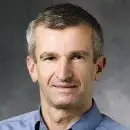
Axel T. Brunger
Axel Brunger received his Physics Diploma at the University of Hamburg in 1980, and his Ph.D. degree from the Technical University of Munich in 1982 working with Klaus Schulten. Subsequently, he was a postdoctoral associate with Martin Karplus in the Department of Chemistry, Harvard University. In 1987, he joined the faculty in the Department of Molecular Biophysics and Biochemistry at Yale University. In 2000, he moved to Stanford University where he is Professor of Molecular and Cellular Physiology. He also holds an appointment as Investigator in the Howard Hughes Medical Institute. In 1995, he was awarded the Röntgen Prize for Biosciences from the University of Würzburg. In 2003, he received the Gregori Aminoff Award of the Royal Swedish Academy. In 2005, he was elected a member of the National Academy of Sciences. In 2011, he received the DeLano Award of the American Society for Biochemistry and Molecular Biology, and in 2014, he received both the Bernard Katz Award of the Biophysical Society and the Carl Hermann Medal of the German Crystallographic Society. In 2016, he received the Trueblood Award of the American Crystallographic Association. In 2021, he was elected a member of the American Academy of Arts & Sciences.
Early in his career, Brunger developed tools for interpreting X-ray crystallography diffraction data that revolutionized structural calculation. In his current research, Brunger applies his expertise in structural biology and biophysics to study the molecular mechanisms of synaptic proteins that enable nerve cell communication. Brunger and his collaborators employ biochemical reconstitution, biophysical analyses, and structural biology methods to investigate the molecular mechanisms of neuronal SNAREs, complexin, and synaptotagmin, as well as other factors involved in priming and pre-synaptic plasticity. His group used single-particle electron cryo-microscopy to determine structures of the supercomplex of SNAREs, the ATPase NSF, and the adapter protein α-SNAP. This subnanometer-resolution structure and functional studies have revealed the first glimpses of the molecular mechanism of NSF-mediated SNARE complex disassembly, which allows SNARE proteins to be recycled for the next round of synaptic vesicle fusion. Recently, Brunger studied the molecular architecture of proteins and protein complexes at the synapse and in synaptic vesicles using cryo-electron tomography, which led to the discovery of new protein-protein interactions.